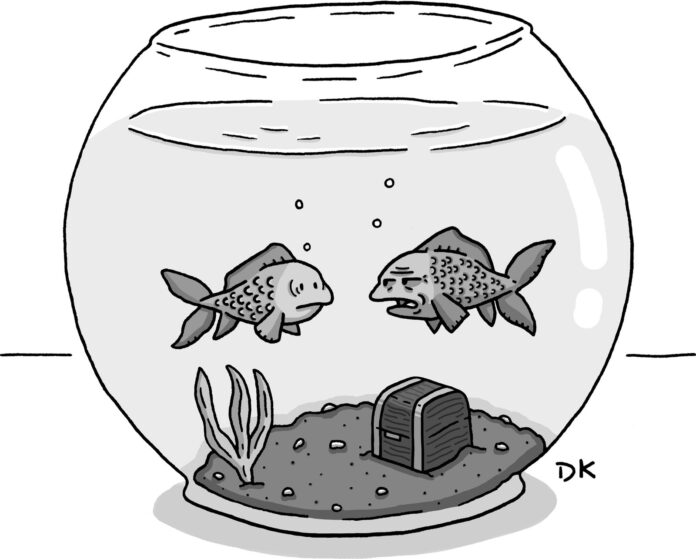Pity the plight of the gay white man. Not as notorious as his heterosexual counterpart, more socially privileged than his queer peers, he has been drained of popular sympathy by virtue of his cultural success. Take the recent film “Fire Island,” Joel Kim Booster’s adaptation of “Pride and Prejudice”: while the Bennet sisters are transformed into a gaggle of gay friends of color (mostly), the role of the villainous Mr. Wickham is given to Dex, a white seducer who deploys his Tom of Finland physique and sterling Instagram politics to prey upon his dazzled prospects. But a gay white guy as a marginalized hero, an underdog whose private tragedies we mourn? That’s a harder sell.
Or so Arthur Less, the protagonist of “Less,” Andrew Sean Greer’s Pulitzer-winning 2017 novel, is forced to conclude. Less, like Greer, is a middle-aged gay white novelist; his latest manuscript, “Swift,” is a sombre tale of—what else?—a middle-aged gay white man who wanders around San Francisco à la Leopold Bloom in Dublin, suffering various setbacks and contemplating his regrets. Less is shocked when his publisher rejects it outright. “It’s a little hard to feel sorry for a guy like that,” a lesbian friend explains. The book, as even Less comes to see, has been artistically petrified by his character’s self-pity, that “gorgon of Caucasian male ego.” It’s as good as dead.
Then Less has an idea. What if he rewrote his tragedy as a farce? Inspiration flows: “With a joy bordering on sadism, he degloves every humiliation to show its risible lining.” Laughter suddenly replaces sighs and tears, and a holy fool steps in for a puffed-up hero.
Less’s strategy is also the strategy of “Less.” The novel maintains a delicious comic buoyancy as it follows the antics of its Buster Keatonish protagonist, buffeting him with one obstacle after another only to have him land, each time, on his feet. Dramatic irony usually casts readers as Cassandras: we watch with dread as unsuspecting characters meet with disaster. But what makes Less so endearing is his sincere ignorance of his good luck. Though Less himself is writing a “gay ‘Ulysses,’ ” the scope of his own journeys is more Homeric than Joycean; he leaves his home in San Francisco to travel to Mexico, then Italy, Germany, France, Morocco, India, and Japan, funding his exploits with teaching gigs, magazine assignments, and the like. The cause of all this wandering is Less’s desire to escape the impending wedding of his former lover Freddy Pelu, an English teacher some fifteen years his junior, whom Less, whether in the spirit of unpossessive generosity (as he wants to believe) or for fear of rejection (the truth), unwisely let get away. But Freddy is closer at hand than Less suspects: he’s the book’s affectionate, rueful narrator. How can he know what Less is doing, never mind thinking and feeling, from the other side of the world? He can’t, of course, and that imaginative leap is part of the book’s charm, the key to its romantic optimism. Telling Less’s story is Freddy’s way of keeping watch over him. You cheer for the couple’s reunion, though hapless Less proves such an enjoyable travelling companion that it’s bittersweet to bid him goodbye as he returns to California to find Freddy waiting for him with open arms.
Apparently, Greer felt the same way, because he has brought Less back, in “Less Is Lost” (Little, Brown), a sequel that picks up the plot nine months later. Freddy has moved into Less’s little house, called the Shack, and wants to get married. Less isn’t so sure. “This is the story of a crisis in our lives,” Freddy, enlisted again as the omniscient narrator, reports. Another one, so soon?
As the novel begins, it is Freddy who is far from home, on a sabbatical in Maine to study “narrative form.” On the verge of flying east to join him, Less learns that his first great love, the renowned poet Robert Brownburn, has died. The two men met on a San Francisco beach when Less was a svelte twenty-one and Robert was more than two decades older and married (to a woman—this was 1987). In fact, it is Robert’s ex-wife, Marian, who gives Less the bad news. And there’s more. The Shack belonged to Robert; when Robert left Less, after fifteen years together, he left him the house, too. Now Marian tells Less that he owes ten years of back rent. If he doesn’t come up with the money in a month, he and Freddy are out.
Less assures Freddy that he has a plan. He’s been asked to write a magazine profile of a best-selling science-fiction writer, H. H. H. Mandern, and is serving on the committee for a fancy literary prize, which entails some kind of honorarium. Also, a Louisiana-based drama troupe is offering Less an improbably fat sum to adapt one of his short stories for the stage and has invited him to tag along on its tour. Freddy manages to douse his skepticism in the name of love, but this reader had a harder time. San Francisco is among the most expensive rental markets in the country; the man needs a MacArthur grant, not a magazine assignment. In any case, the money is merely a pretext for Greer to send Less on another roving adventure, this one across the continental United States, beginning in Palm Springs, where he meets up with the gruff, shambolic Mandern—a George R. R. Martin type who enlists Less to chauffeur him and his pug across the Southwest in an old camper van—and ending in Delaware, Less’s home state. The novel advances by way of a series of road-trip encounters with characters who are mostly also “characters,” like Arathusa, who leads an off-the-grid Arizona commune and whose personal motto is “Know no no,” and Miss Dorothy Howe-Gorbaty, the head of the theatre troupe, a steel magnolia with a penchant for dancing the Carolina shag. Less, who gets custody of the van, and the dog, after Mandern makes his exit, spends a great deal of time in R.V. parks—where he nervously tries to camouflage his sexuality by purchasing “a red bandanna, wraparound sunglasses, a HOOT ’N’ HOLLER T-shirt, flip-flops, a baseball cap, a cowboy hat, a bolo tie, and six miniature American flags”—and in beer bars, including one in Alabama where a patron surprises him by asking, “thoughtfully,” what it’s like to be gay. So much for disguises.
Homophobia isn’t a serious risk in the benign world of the “Less” books. The real threat comes in the form of the accusation—lobbed, inevitably, by a fellow middle-aged white gay male writer—that Less is a “bad gay,” too conciliatory to hetero sensibilities in his prose. The charge stings because Less fears that it may be true, and not just on the page. “When he moved to New York after college, in the eighties,” Freddy tells us, “Arthur Less certainly tried his hardest to be gay”:
This deadpan passage is typical of Greer’s best comic writing, with its exquisite attention to rhythm, repetition, and timing, the bright sentences tossed up like juggling balls to be caught in dazzling rotation.
Sexuality is one kind of performance. Nationality is another. Less’s countrymen often mistake him for a foreigner, a fair confusion when it comes to a member of that dreaded coastal caste, the publishing world, “which, like an orbiting space station, looks upon the rest of America without ever interacting with it.” To a globe-trotting “Minor American Novelist,” nowhere could be more exotic than America itself. Greer, a resident of San Francisco and Milan—the one in Italy, not to be confused with those in Georgia, Michigan, Indiana, Illinois, Ohio, New Mexico, or New York—is gamely implicating himself. His acknowledgments include a note of thanks to the Guggenheim Foundation “for the grant that allowed for all the RV rentals.” He, too, has charted a course across the country’s great middle, and his findings, or Less’s, are often lovely. “You would think nothing would be as well oiled as the derricks pumping along the Mississippi River. And yet they squeak all night,” one perfect postcard of a paragraph reads.







